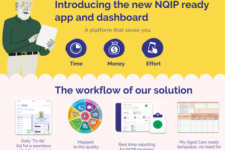Implementing Continuous Quality Improvement in aged care.
In recent years, Continuous Quality Improvement (QCI) has received an increased amount of attention in aged care as a way to enhance quality and build a sustainable, consumer-driven aged care system.
In fact, with the rollout of the new aged care quality standards in mid-2019, all aged care and home care providers were required to have a written plan for continuous improvement (PCI) explaining how they will assess, monitor and improve their quality of care and services, measured against the Quality Standards.
Originating from theories and approaches used in the industrial sectors, CQI is the iterative use of processes to identify quality problems, develop solutions, and to implement and evaluate changes.
Over the past decade, CQI has been extensively adopted and evolved within the health sector, putting the focus on the ‘customer’ through an emphasis on creating the best possible experiences and outcomes.
Essentially, CQI for aged care providers means a shift in thinking from best practice to better practice. The idea that, to deliver better aged care services, there are always things that can be improved.
Surprisingly for many aged care providers, something as important as a CQI plan is often an antiquated system that doesn’t easily allow managers and head office to have a full line of sight over implementation or outcomes. Creating many blind spots when it comes to risk, compliance and governance.
Striving to do things better. Where do you start?
The first step in successfully implementing continuous quality improvement is realising that a proactive approach is required.
While the traditional “record, respond, report” method may address individual issues and complaints, it does not drive overall better quality.
Successful CQI requires an organisation to shift their culture and encourage team members to be inquisitive and continually look at ways to do things better.
“CQI is a philosophy that encourages all team members to continuously ask: “How are we doing?” and “Can we do it better?”
Edwards, 2008.
Ultimately, it requires that we accept that no matter how well we think we are performing there are always improvements to be made, things we can adapt to meet changing expectations or needs, or things we can do more efficiently.
No issues to address? Think again.
Organisations often monitor the effectiveness or satisfaction with their service based on the number of complaints they receive. And often wrongly assume if no one is coming to them to tell them they are not happy or are dissatisfied, that there is nothing that needs improving.
But many people living in or receiving care don’t speak up or share their concerns.
A recent study by the National Ageing Research Institute (NARI) found that many concerns people have about aged care are not raised either formally or informally, with the reasons cited including they do think anything will change, the concerns are too minor, they don’t want to be a nuisance or they are not sure who to report it to.
If you’re finding that you don’t have any useful data insights to allow you to identify improvement areas, this may be a sign that your feedback systems need to be improved.
Do you have the data you need to drive CQI?
While complaints data can provide a small part of the picture or highlight what needs to be improved, proactively monitoring and gathering feedback from residents, family and team members will give better insights into current performance and potential problem areas.
Without actively measuring experiences and gathering baseline data, it is difficult to know what needs to be improved and highlight any achievements that have been made.
Data is central to CQI.
Good data will provide you with meaningful insights and trend data, allowing you to make decisions and prioritise improvements that benefit the majority, rather than making assumptions or responding to isolated occurrences.
And in the complex and busy word of aged care, we need this data to be easy to gather, quick to access and clearly reported.
A little bit better, every day.
As an aged care manager, the development and implementation of plans for improvement may seem like an additional burden on your already overstretched time.
But with the right systems and processes, a small regular amount of time monitoring and reviewing feedback and complaints can head off larger, more time-consuming issues, in the future.
REMEMBER: CQI is not about fixing big problems in one go, but implementing a number of actions that address issues or drive improvements one small step at a time.
And, when implemented well, CQI has the potential to uncover solutions that deliver better outcomes and create huge efficiencies for everyone – staff and residents/clients alike.
Implementing CQI doesn’t need to be complicated with CarePage Business.
With CarePage Business you can capture feedback, review insights, identify trends and create actions in your PCI all in one single, easy to use platform.
Book a demo to find how we can support you to measure and improve experiences.













